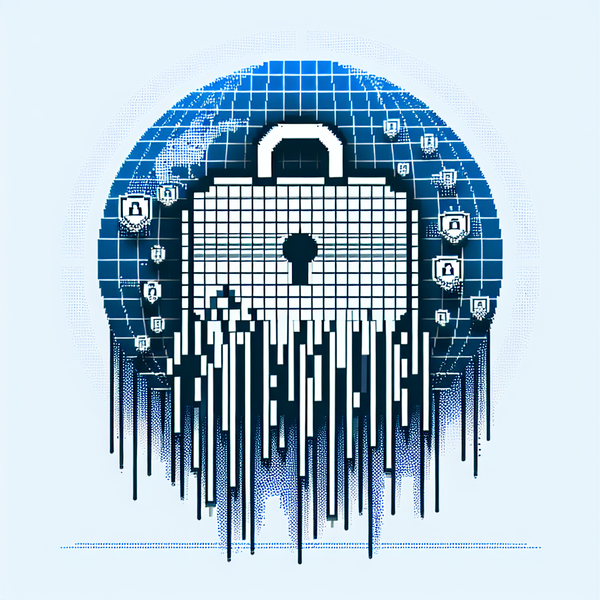Secret CISO 9/17: Lotte Card & China's Firewall Breaches, NPM Worm & AI Disinfo Surge, Microsoft Edge Spoofing Risk

Welcome to today's edition of Secret CISO, where we unravel the intricate web of cybersecurity breaches and vulnerabilities that are shaping the digital landscape. In a world where data is the new currency, today's revelations are a stark reminder of the fragility of our digital fortresses.
We begin with a deep dive into the Lotte Card data breach, which has proven to be more catastrophic than initially reported, exposing sensitive financial information of countless customers. This incident raises pressing questions about the company's data security protocols.
Meanwhile, a historic breach has pierced the veil of China's Great Firewall, revealing vulnerabilities that could have far-reaching implications for national security and privacy. This breach underscores the critical need for robust cybersecurity measures in even the most fortified digital infrastructures.
In the realm of healthcare, the Ohio Medical Card breach has potentially exposed nearly a million patient records, highlighting the urgent need for stringent data protection in the healthcare sector. Similarly, breaches at Hampton Regional Medical Center and Integrity Testing & Safety Administrators have sparked legal actions and concerns over data protection practices.
On the software front, the Shai Halud worm has infiltrated 187 NPM code packages, posing a significant threat to the software supply chain. This attack, alongside the insertion of credential-stealing code into NPM libraries, underscores the vulnerabilities within the open-source ecosystem.
As we navigate these turbulent waters, the rise of AI chatbot disinformation and the potent FileFix phishing attack remind us of the evolving nature of cyber threats. These incidents call for heightened vigilance and improved security measures to safeguard our digital world.
Finally, we explore a series of critical vulnerabilities, including those affecting Microsoft Edge for Android and Spring Cloud Gateway Server, which could lead to unauthorized access and data breaches. These vulnerabilities serve as a stark reminder of the ongoing battle to secure our digital environments.
Stay informed, stay secure, and join us as we continue to uncover the hidden threats lurking in the shadows of cyberspace.
Data Breaches
- Lotte Card's data breach more severe than initially reported: Authorities have revealed that the data breach at Lotte Card Co. is more extensive than initially thought, impacting a larger number of customers and exposing sensitive financial information. The breach has raised significant concerns about data security practices within the company. Source: Yonhap News.
- China's Great Firewall Data Breach: A historic data breach has compromised confidential and protected information related to China's Great Firewall. This breach has significant implications for national security and privacy, highlighting vulnerabilities in China's cybersecurity infrastructure. Source: Hudson Institute.
- Integrity Testing & Safety Administrators Data Breach: A potential class action lawsuit is being investigated following a data breach at Integrity Testing & Safety Administrators. The breach has exposed sensitive information, prompting legal scrutiny and concerns over data protection measures. Source: ClassAction.org.
- Hampton Regional Medical Center Data Breach: A data breach at Hampton Regional Medical Center has led to the exposure of sensitive patient information. Legal actions are being considered as affected individuals seek to understand the extent of the breach and its implications. Source: ClassAction.org.
- Trusteed Plans Service Corporation Data Breach: Attorneys are investigating a potential lawsuit over a data breach at Trusteed Plans Service Corporation. The breach has raised concerns about the security of personal information and the company's data protection practices. Source: ClassAction.org.
Security Research
- Kull wahad! Shai Halud worm infects more than a hundred NPM code packages: The Shai Halud worm has infiltrated 187 NPM code packages, posing a significant threat to the software supply chain. Named by security researcher Brian Krebs, this worm-style campaign is a coordinated attack targeting open-source repositories. The impact of this attack highlights the vulnerabilities within the NPM ecosystem and the need for enhanced security measures. Source: Cyber Daily, Bleeping Computer.
- Risky Bulletin: AI chatbot disinformation doubles in a year: The spread of disinformation through AI chatbots has doubled over the past year, raising concerns about the integrity of information shared online. This trend underscores the growing challenge of managing AI-generated content and the potential for misuse in spreading false narratives. Security experts emphasize the need for robust verification mechanisms to counteract this rising threat. Source: Risky Biz News.
- Federal lawsuits claim Ohio Medical Card exposed nearly 1 million patient records online: A significant data breach involving the Ohio Medical Card has potentially exposed nearly one million patient records online. The breach includes sensitive information such as social security numbers and medical records. This incident highlights the critical need for stringent data protection measures in the healthcare sector to safeguard patient privacy. Source: WOSU, WVXU.
- Warning: Hackers have inserted credential-stealing code into some npm libraries: Researchers at Step Security have identified a major escalation in threats to the NPM ecosystem, with hackers inserting credential-stealing code into certain libraries. This development poses a significant risk to developers and organizations relying on these libraries, emphasizing the need for vigilant security practices and regular code audits. Source: CSO Online.
- Innovative FileFix Phishing Attack Proves Plenty Potent: The FileFix phishing attack, initially conceptualized by a security researcher known as "mr. d0x," has seen a 517% surge in incidents over the past six months. This social engineering tactic tricks victims into executing infostealers, posing a significant threat to personal and organizational data security. The rise in these attacks calls for heightened awareness and improved phishing detection mechanisms. Source: Dark Reading, The Register.
Top CVEs
- CVE-2025-47967: Insufficient UI warning of dangerous operations in Microsoft Edge for Android allows an unauthorized attacker to perform spoofing. This vulnerability could lead to users being misled into performing unintended actions, potentially compromising their security. Source: Vulners.
- CVE-2025-49728: Cleartext storage of sensitive information in Microsoft PC Manager allows an unauthorized attacker to bypass a security feature. This flaw could lead to unauthorized access to sensitive data, posing a significant risk to user privacy and system integrity. Source: Vulners.
- CVE-2025-41243: Spring Cloud Gateway Server Webflux may be vulnerable to Spring Environment property modification. This vulnerability could allow attackers to manipulate application configurations, potentially leading to unauthorized access or data breaches. Source: Vulners.
- CVE-2025-41248: The Spring Security annotation detection mechanism may not correctly resolve annotations on methods within type hierarchies, resulting in an authorization bypass. This issue could allow unauthorized users to access restricted functionalities, compromising application security. Source: Vulners.
- CVE-2025-34187: Ilevia EVE X1/X5 Server version ≤ 4.7.18.0.eden contains a misconfiguration in the sudoers file, allowing passwordless execution of certain Bash scripts. This vulnerability could lead to remote privilege escalation, granting attackers full root access to the system. Source: Vulners.
Final Words
As we wrap up today's edition of Secret CISO, it's clear that the landscape of cybersecurity is as dynamic and challenging as ever. From the extensive data breaches at Lotte Card and Hampton Regional Medical Center to the sophisticated Shai Halud worm infiltrating NPM packages, the threats we face are evolving rapidly. Each incident underscores the critical importance of robust security measures and the need for constant vigilance in protecting sensitive information.
We've also seen how vulnerabilities, such as those in Microsoft Edge for Android and Spring Cloud Gateway Server, can pose significant risks if left unaddressed. These stories serve as a reminder of the ongoing battle against cyber threats and the necessity for continuous improvement in our security practices.
As we navigate these challenges, sharing knowledge and staying informed are key. If you found today's insights valuable, please consider sharing this newsletter with your friends and colleagues. Together, we can build a more secure digital world by spreading awareness and fostering a community of informed and proactive cybersecurity professionals.
Thank you for joining us today. Stay safe, stay secure, and we'll see you in the next edition of Secret CISO.




